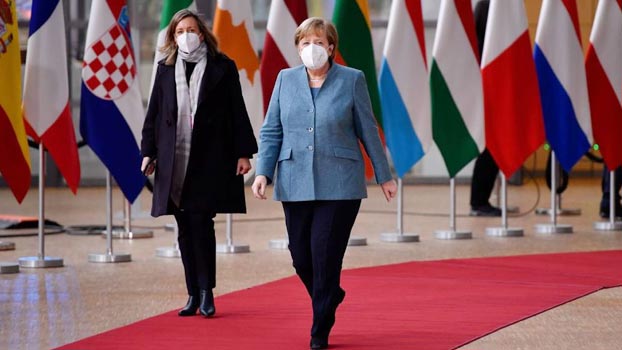Merkel’s deal with Hungary and Poland is a compromise too far
For the sake of an important budget and stimulus deal, the European Union is close to selling its democratic soul

The compromise was struck between her authorities, which at present holds the EU’s rotating presidency, and two rogue member states, Hungary and Poland. They’ve been threatening to veto the bloc’s seven-year price range and a pandemic restoration fund, value a mixed 1.8 trillion euros ($2.2 trillion). Budapest and Warsaw have been holding the bundle hostage as a result of they needed to take away a mechanism that ties EU funds to observance of the rule of legislation.
Here’s the fudge: The mechanism continues to be there within the textual content, unaltered, so the EU can say it stayed agency. But it’s been been neutered with further “interpretations” in order that it’ll nearly actually by no means be utilized. That in flip permits Hungary and Poland to declare victory and let the EU’s cash stream — not least, to them.
The background is that Hungary for a decade and Poland for half as lengthy have been whittling away at basic rules of liberal democracy, to which they acceded after they joined the EU in 2004. Stealthily and cynically, their populist governments have been infringing on judicial independence and extra — sufficient for Brussels to launch formal proceedings towards them below Article 7 of the European treaties.
That course of, nevertheless, is notoriously toothless, as a result of sanctions towards any member state would require a unanimous vote by the opposite 26, and Budapest and Warsaw have one another’s again. So the Netherlands and a few likeminded international locations, in addition to the European Parliament, insisted on a further mechanism to be included in a historic budget-cum-stimulus deal struck in July.
Almost as quickly as that clause was written, the standard haggling broke out about what it may imply. Euro-hawks claimed it was easy: No rule-of-law, no cash. Hungary and Poland threatened to sink the entire deal.
So the merkeling began. In a first spherical of compromise, the wording was diluted in order that the mechanism turned nearly ineffective. It now applies solely to these rule-of-law breaches that straight corrupt using cash from Brussels. It not has any bearing on all different violations, from cherry-picking judges to harassing journalists, lecturers or opponents.
Even this gesture from Brussels, astonishingly, wasn’t sufficient to appease Budapest and Warsaw. Hence Merkel’s ultimate fudge: On high of the mechanism’s earlier dilution, there’s now additionally the prospect of indefinite delay. The clause received’t kick in till Hungary and Poland get a probability to take it to the European Court of Justice in Luxembourg. Those judges will take their candy time, and a choice isn’t anticipated till mid-2022. Conveniently, this can come after Hungary’s parliamentary election, slated for early 2022.
Viktor Orban, Hungary’s prime minister, can subsequently preserve taking part in his cynical recreation of pocketing the European money that buoys his submerging economic system whereas working a quasi-autocracy. His nation is a massive web beneficiary of the EU price range, and stands to get one other 6.2 billion euros from the pandemic stimulus fund he’s so graciously permitting now. Poland can count on much more: It’s the only largest web recipient of European cash, and would get 23.1 billion euros on high from the stimulus.
Some reviews recommend that there might have been further understandings within the compromise. Even after the Luxembourg courtroom approves the rule-of-law mechanism, Hungary and Poland can most likely attraction or deflect selections, thus stretching them out perpetually. Portugal, which can take over the EU presidency on Jan. 1, might also deliver the separate Article 7 proceedings to an official shut.
Merkel’s fudge is as disappointing as it’s pointless. As I argued final week, the EU held all of the trump playing cards on this bluffing recreation. It may have delayed the adoption of its seven-year price range and as an alternative entered 2021 with an annual emergency price range. And the 25 international locations apart from Hungary and Poland may have raised the restoration fund on their very own. That would have introduced Budapest and Warsaw in line quick.
In normal, fudging — and Merkel’s knack for it — is an underappreciated artwork. It’s typically the one approach to get something accomplished in politics, and not solely within the EU. And but the rule of legislation isn’t a technical matter like, say, a decision fund for European banks or pointers for public deficits.
Judicial independence and the related establishments of a free press and civil society are important for a supranational bloc that’s in the end held collectively by values. As the historian and creator Timothy Garton Ash informed me, the rule of legislation is in reality “existential” for the union. Dilute it, and you start dissolving the EU.
Europe below the management of Angela Merkel, as a consequence of retire in lower than a yr, had a Faustian option to make: It may arise for its values, even at the price of delaying a mandatory infusion of cash, or it may get the money flowing, however on the value of promoting its soul. Unfortunately, the EU failed the check.
Andreas Kluth is a columnist for Bloomberg Opinion. He was beforehand editor in chief of Handelsblatt Global and a author for the Economist.
Source: Bloomberg




